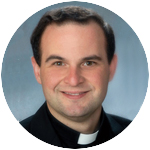
Father Eric J. Banecker
Pope Francis is known for memorable turns of phrases. One of my personal favorites came early in his pontificate, when he said, “The church is not an NGO!”
NGOs are “non-governmental organizations,” independent groups affiliated with the United Nations that carry out various kinds of service work around the world. Indeed, they often provide relief to people in dire situations. His remark was not meant to denigrate their work in any way.
Rather, it was to point out an important distinction; namely, that the Catholic Church’s charitable efforts come from a very specific source, the eucharistic altar, which is the source and summit of the church’s life.
In this, Pope Francis was echoing beautifully the words of Pope Benedict XVI in his encyclical Deus caritas est, who reminded the church that her charitable work “does not simply offer people material help, but refreshment and care for their souls, something which often is even more necessary than material support” (28b).
[hotblock]
I thought of this when reading Chief Justice John Roberts’ opinion in Fulton, et al. v. City of Philadelphia, the recent Supreme Court decision that reversed the opinion of the Third Circuit Court of Appeals, opening the door for Catholic Social Services to once again provide foster service for the most vulnerable young people in our area. I have great respect for the chief justice, despite (because of?) the frequent criticism lobbed at him from professional opinion-givers from both sides of the political spectrum.
In this case, the opinion he wrote defending the religious freedom of Catholic Social Services was joined by all eight of the associate justices. Not a small feat in these times!
The ruling is a unanimous acknowledgement from the highest court in the land that Catholic Social Services of the Archdiocese of Philadelphia – like every Catholic organization in the world – is unique. It isn’t just another bunch of do-gooders or technocrats out to change the world. Rather, the church is, by its very nature, a body, a living organism of believers who have been changed by Jesus Christ. And his radical call to love and service underlies all the actions we take in the world – or at least it should.
The City of Philadelphia – in denying the church’s ability to offer foster-care services due to its policy on LGBT couples – clearly failed to recognize that. It is offensive to me that my home city would treat the Catholic Church – or any religious organization for that matter – as just another group they contract with.
At issue here is not unjust discrimination against gays and lesbians, but rather the right of a religious organization to carry out its work without an undue burden from the government. The Supreme Court of the United States resoundingly reminded Philadelphia of the special status of religious groups, enshrined in the free exercise clause of the First Amendment.
For us Catholics, though, the court’s decision should be a different kind of reminder. If the law of the land upholds the fact that we are different from all other contracting organizations, then we need to act like it. While it may be appropriate and helpful to adopt various strategies common to secular groups, we must never forget that Jesus Christ is the reason that all of our schools, hospitals, and social services exist. They are simply organized expressions of his Sermon on the Mount.
And while we must never proselytize or seek to impose our beliefs on others, we must at the same time never be afraid to announce why we do the things that we do. We serve not because those in need are Catholic, but because we are Catholic. And that means we must be faithful to all the teachings of Christ and his church even if – as in this Supreme Court case – it requires us to suffer for what is right.
Catholic Social Services is not an NGO. Rather it is part of the response of the Church of Philadelphia to Matthew 25 (“for I was hungry and you gave me food … I was a stranger and you welcomed me …”). We should be proud of the work we do, and we should be grateful for the Supreme Court’s recognition of our freedom to do it. But we should use this as an opportunity to renew the Catholic identity of all our organizations.
That identity is not so much about cultural ties, but about our common faith in Christ the Risen Lord and our fidelity to the church’s teachings, including her understanding of the human person. Not all of those teachings are always popular, but we have to trust that if we remain faithful to them, God will transform the hearts of many through our service to those most in need.
Now that this legal fight is over, let’s get back to following the call of Christ: to humbly serve those in need in the eucharistic spirit of self-gift, so that many, including those who don’t agree with the court’s opinion, may experience the transforming love and mercy of Christ, who came “not to be served, but to serve.”
***
Father Eric J. Banecker is pastor of St. Francis de Sales Parish, Philadelphia.
PREVIOUS: Trust restored by child’s innocence, ‘the Father’s blood’
NEXT: Reckoning with the church’s constellation of unmarked graves


Share this story